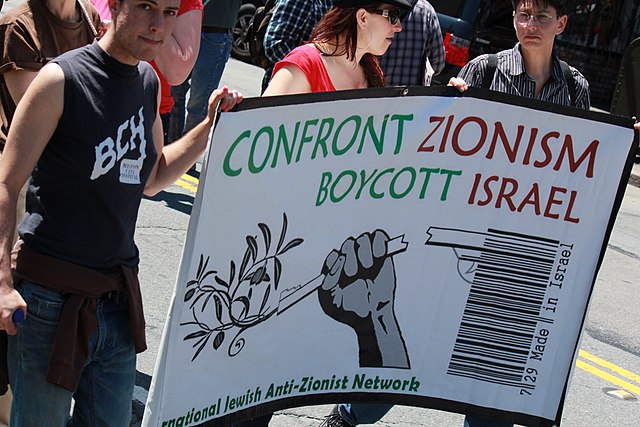How Effective are the Boycotts for Palestine?

Protest Banner Encouraging the Boycott of Israeli Companies. Photo: Wikimedia
By: Joud Sleilaty / Arab America Contributing Writer
In the face of the ongoing war in Gaza, individuals from around the world are searching for ways to encourage a ceasefire and show support to Palestinians. One particular approach is the Boycott, Divestment, and Sanctions (BDS) movement, a global nonviolent protest movement that employs economic and cultural boycotts, financial divestment, and government sanctions as tools to encourage Israel to adhere to international law and reconsider its contentious policies towards Palestinians
What is BDS?
BDS, short for Boycott, Divestment, and Sanctions, is a grassroots initiative that seeks to employ nonviolent pressure on Israel, compelling it to comply with international law. The movement focuses on three fundamental demands: ending the occupation on Palestine, promoting equality between Israelis and Palestinians, and fighting for the right of Palestinians to return. While BDS has been present for two decades, it has recently gained more attention, particularly due to the ongoing Gaza war, which has put its goals and impact in the spotlight.
BDS Campaigns
BDS has been known for its boycotts, which not only include Israeli products and companies but also non-Israeli corporations that are considered to be in support of the oppression of Palestinians. On social media platforms like Twitter and TikTok, the hashtag #BDSMovement is being used to identify brands with ties to Israel and call for boycotts. McDonald’s, for example, became a target when one of its locations in Israel offered free food to the Israeli military. Similarly, global fast-food chains like Domino’s Pizza and Burger King are also being boycotted. Starbucks is also affected by the boycotts after suing its labor union for expressing support for Palestinians, raising allegations of their support to Israel.
However, the BDS movement has faced various challenges, as some of its protests have escalated into non-peaceful ones, targeting corporations and leading to destructive actions as well as showing disrespect towards innocent employees. These incidents have created backlash and raised concerns about the legitimacy and effectiveness of the movement. In response to these unfortunate instances, there is a growing emphasis on the importance of maintaining peaceful and nonviolent approaches within the BDS movement.
Effectiveness of BDS
Some people are questioning the effectiveness of the movement’s boycotts, considering that many of the targeted companies’ locations operate through franchises that pay a royalty fee to the parent corporation for the use of their brand. The royalty fee varies by company and represents a recurring payment based on the franchisor’s terms and the agreement in place. For instance, in the case of Starbucks, the royalty fee is set at 7% of the franchise’s revenue, and the initial investment for starting a franchise can range from $50,000 to $500,000. Starbucks, unlike some other companies, does not require a franchise fee; instead, there’s a $315,000 licensing fee and net worth requirements for Starbucks-licensed stores. When factoring in various startup costs and ongoing royalties, it’s essential to acknowledge that the percentage of consumers’ payments that actually reach the parent corporation is relatively small, although not negligible.
Furthermore, the BDS movement has made a mark on various artists who chose to cancel or delay their shows and performances in Israel. Public figures such as Sam Smith, Elvis Costello, Lauryn Hill, Lana Del Rey, Bruno Mars and Lorde amongst many others, have taken such actions.
Government sanctions, while a part of the BDS framework, have been more challenging to implement due to the complexity of politics. Nonetheless, even with those challenges being present, BDS efforts have still tried encouraging governments and international bodies to consider taking diplomatic measures against Israel, particularly when it comes to issues related to settlements and human rights violations.
Conclusion
In conclusion, the BDS movement, with its three core demands and its various campaigns, has brought the Palestinian-Israeli conflict to the forefront of global awareness. It has affected corporations, artists, universities, and organizations, with varying degrees of success. While the movement has faced criticism and challenges, its impact on the ongoing conflict remains a subject of debate. For the BDS movement to realize its objectives, it must continue to emphasize the importance of maintaining peaceful and nonviolent approaches and encourage even greater global participation in its efforts.
Check out Arab America’s blog here!








